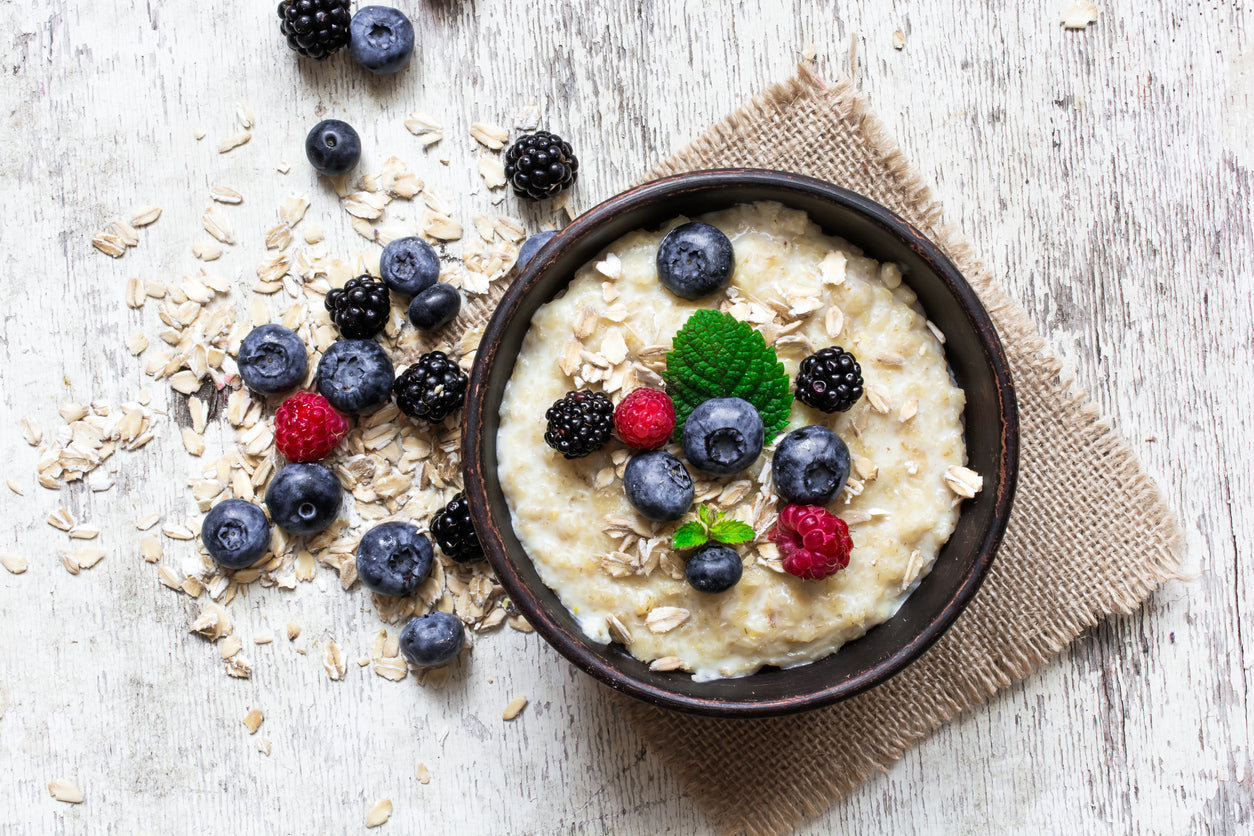“Oat-standing” benefits: how oatmeal promotes optimal health and supports immunity

There’s no denying the appeal of a steaming bowl of oatmeal on a frigid winter morning – and its ability to provide energy, sustenance and warmth. In fact, when you think about it, oatmeal might be the original “comfort” food - a recent discovery by Italian archeologists suggests that humans may have been consuming some form of oatmeal since the dawn of the Stone Age!
But, oatmeal does far more than just provide a filling breakfast. Recent research shows that powerful compounds in oatmeal have the ability to promote optimal health and provide immune support.
Oatmeal helps regulate blood sugar
Scientists have found that eating oatmeal may help prevent harmful post-meal blood sugar “spikes.” A new review of studies published in the European Journal of Clinical Nutrition shows that beta-glucan, a soluble fiber found in oatmeal, can reduce after-meal blood glucose levels by a significant 23 percent, while increasing insulin response. The review authors added that earlier trials had already demonstrated that as little as 2.5 to 3.5 grams of oat beta-glucan a day could significantly lower HbA1c levels (a measure of long-term blood sugar control) in people with type 2 diabetes.
While the researchers weren’t sure exactly why beta-glucan has this effect, they theorized that it could result from the ability of this versatile fiber to slow stomach emptying and improve the health of the gut microbiome. Another “plus” of consuming oatmeal is that it can cause a feeling of fullness and help to avoid overeating later in the day. Oatmeal not only contributes to a satisfying breakfast, but it may help discourage the onset of overweight, obesity, prediabetes and type 2 diabetes. It’s a win/win!
Reduce the risk of heart disease
The health benefits of oatmeal don’t stop with blood sugar control. The review authors pointed out that beta-glucan in oats can also help fight heart disease by lowering levels of harmful LDL cholesterol. In fact, some natural health experts liken the effect of soluble fiber to that of a “Roto-Rooter,” clearing out cholesterol that may accumulate in arterial walls. This pays off in increased heart health.
A 2019 review involving over 4,600 participants and published in The Lancet showed that people with the highest intakes of dietary fiber had up to a 30 percent lower risk of coronary artery disease, stroke and heart disease-related death - when compared with people who consumed the lowest amounts.
And, that isn’t all. The higher-fiber group also had lower body weight. According to The American Heart Association, oats are particularly effective in reducing a specific type of fat known as visceral (or abdominal) fat, which is linked with higher risk of heart disease. Finally, the high-fiber group had lower total cholesterol and lower systolic blood pressure.
Give your immune system a boost with oatmeal
Oatmeal has been shown to improve the bacterial balance of the gut microbiome, the community of “friendly” microbes in the digestive tract. Recent research has highlighted the ability of a balanced microbiome to support immune system health and reduce inflammation.
In fact, researchers have found that the prebiotic fiber in oats help to increase levels of Bifidobacteria, a particularly beneficial (and cholesterol-lowering) type of gut bacteria. In addition, oats are rich in health-promoting antioxidants known as avenanthramides. Finally, oatmeal provides minerals essential to immune system health, such as zinc, manganese, selenium and iron.
Step up your oatmeal game with toppings
Oats are not only low in fat and free of sugar but are naturally gluten-free - although experts advise checking your brand’s label to be sure there has been no cross-contamination. According to the United States Department of Agriculture, a cup of cooked oatmeal provides 140 calories, 28 grams of complex carbohydrates and 5 grams of protein. And, with 4 grams of soluble and insoluble fiber, the serving provides about 15 percent of the recommended daily intake of fiber for adults.
Oatmeal’s mild flavor makes it a perfect vehicle for naturally sweet, nutty or zesty toppings. Add flavor, texture and healthy fat to oatmeal with ground cashews, walnuts, pecans or almonds - or consider mixing in chia or flax seeds. Of course, plump, sweet raisins are a classic addition, as are sliced apples and bananas. For extra antioxidant punch, sprinkle on the cinnamon. And blueberries, raspberries and blackberries are great for adding sweetness and color, along with disease-fighting anthocyanins.
(And, do we even need tell you to bypass pre-packaged instant oatmeal in favor of “old-fashioned” steel-cut or rolled oats? The latter is far superior. Also, it's best to choose an organic brand).
Packed with healthy fiber and brimming with antioxidants and micronutrients, oatmeal is a fabulous addition to your daily diet.
Sources for this article include:
-
Posted in
beta-glucan, gut microbiome, heart disease, oatmeal, prebiotic fiber, type 2 diabetes






